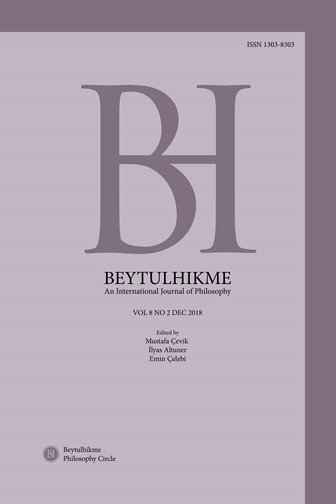Author :
Abstract
İslam filozofu Muallim-i Sânî Ebû Nasr el-Fârâbî (872-951), eserlerinden de anlaşılabileceği gibi bir toplum filozofudur. Gerçekten de toplum, Fârâbî felsefesinin en temel konularındandır. Çünkü Fârâbî için insan ve insanın mutluluğu, her şeyin başında gelir. İnsan ise tabiatı gereği toplumsal bir varlıktır ve dolayısıyla insanın mutluluğu doğrudan toplum ile, toplum hayatının insan için zorunlu olmasıyla ilintilidir. Toplumsal hayat, insanların bir arada, toplum halinde yaşamaları, insan ve mutluluğunun zorunlu bir boyutudur. Bu yönü dikkatlice incelendiğinde, Farabî’nin insan, mutluluk, medîne, medeniyet, cemaat, ictimâ’, ictimâ’ât, ma’mûra, ihtiyaç, teâvun, kavm, ümmet, din, mille, vd. anahtar kavramlarından hareketle bir toplum görüşü ortaya koymaya çalıştığı anlaşılır. Fârâbî’nin ilgili kitapları ile konuyla alakalı diğer kaynaklardan yararlanılarak yapılan bu çalışmada Fârâbî, felsefesi içinde saadet, irade, ihtiyar, ihtiyaç, teâvun, cemaat, ictimâ’, ictimâ’ât, kavm, ümmet, nâs, medîne, medeniyet, millet, din ve ma’mûra gibi temel/anahtar kavramlar ele alınmakta ve anlaşılmaya çalışılmaktadır. Bu kavramlar, Muallim-i Sânî’nin toplum felsefesine giriş niteliği taşımaktadır. Bu kavramlar bilinip anlaşılmadan Fârâbî’nin genel toplum temasının anlaşılması mümkün gözükmemektedir.
Keywords
Abstract
Islamic philosopher, the Second Master, Abu Nasr al-Farabi is a social philosopher as can be understood from his works. Indeed, society is one of the most fundamental subjects of al-Farabi’s philosophy. Because, for al-Farabi, human and the happiness of human comes at the beginning of everything. Human is a social entity by its very nature, and therefore the happiness of human is directly connected with society and that social life is obligatory for a human. Social life, that people live together and within society is a compulsory aspect of human and him/her happiness. When this aspect is carefully examined, it is understood that al-Farabi tries to reveal a social conception from on key concepts such as human, happiness, medina (city, society, politics), civilization, community, ijtima (getting together, meeting), ma'mura, need, helping one another, society, tribe, ummah, religion, millah, etc. In this work made by utilizing the relevant books of al-Farabi and other sources related the issue, the author tries to consider and understand the essential key concepts such as the happiness, will, need, helping one another, community, ijtima, tribe, ummah, people, human beings, madina, civilization, millah, religion and ma'mura in al-Farabi’s philosophy. These concepts are in the entrance of qualification to the Second Master’s social philosophy. Without understanding these concepts, it is not possible to understand the general society theme of al-Farabi.
Keywords
- el-Askerî (1994). Kitâbu’l-Furûk. (Nşr. A. S. Hımsî). Trablus: Cürus Bers.
- el-Beydavî (1988). Tefsiru’l-Beydâvî. Beyrut: . Müessesetü'r-Risâle.
- el-Cevherî (1990). es-Sıhah Tâcu’l-Lüğa ve’s-Sıhâhu’l-Arabiyye. Beyrut: Dâru’l-İlmi li’l-Melayîn.
- el-Endülüsî (1989). el-Ikdu’l-Ferîd. Beyrut: Dâru İhyâi’t Tüsrâsi’l-Arabî.
- Fârâbî (1971). Fusûlun Munteze’a. (Thk. F. M. Neccar). Beyrut: Dâru’l-Meşrik.
- Fârâbî (1990). İhsâu’l-Ulûm. (Çev. A. Ateş). Ankara: MEB.
- Fârâbî (1991). Kitâbu’l-Mille. (Thk. M. Mehdî). Beyrut: Dârü’l-Meşrık.
- Fârâbî (1995a). Arâu Ehli’l-Medîneti’l-Fâdıla. (Ed. A. B. Melham). Beyrut: Dâr ve Mektebetu’l-Hilâl.
- Fârâbî (1995b). es-Siyâsetu’l-Medeniyye. (Ed. A. B. Melham). Beyrut: Dâr ve Mekte- betu’l-Hilâl.
- Fârâbî (1995c). Tahsîlu’s-Saâde. (Ed. A. B. Melham). Beyrut: Dâr ve Mektebetu’l- Hilâl.
- Fârâbî (1996). İhsâ’u’l-Ulûm. (Ed. A. B. Melham). Beyrut: Dâr ve Mektebetu’l-
- Fârâbî (2001). el-Medînetu’l-Fâzıla. (Çev. N. Danışman). Ankara: MEB.
- Fârâbî (2002). Kitâbü'l-Mille. (Çev. F. Toktaş). Divan Dergisi, 12 (1), 258-273.
- Fârâbî (2005a). Tenbîh ‘alâ Sebîli’s-Sa’âde: Mutluluk Yoluna Yöneltme. (Çev. H. Özcan). Fârâbî’nin İki Eseri. İstanbul: İFAV, 159-190.
- Fârâbî (2005b). Fusûlü’l-Medenî. (Çev. H. Özcan). Fârâbî’nin İki Eseri. İstanbul: İFAV, 45-138.
- Fârâbî (2008). Kitâbu'l-Huruf: Harfler Kitabı. (Çev. Ö. Türker). İstanbul: Litera.
- Fârâbî, (2012). es-Siyâsetu’l Medeniyye veya Mebâdi’ül-Mevcûdât. (Çev. M. S. Aydın, A. Şener ve M. R. Ayas). İstanbul: Büyüyen Ay.
- Fârâbî (2013). İdeal Devlet. (Çev. A. Arslan). Ankara: Divan Kitap.
- Fârâbî (2014a). Risâletu’l-Hurûf. http://www.muslimphilosophy.com/#people. 15.09.2014.
- Fârâbî (2014b). İhsâu’l-Ulûm. (Çev. A. Arslan). Ankara: Divan Kitap.
- İbn Haldun (1996). Mukaddime. (Thk. D. el-Cüveydî). Beyrut: el-Mektebetu’l- Asriyye.
- Korkut, Ş. (2006). İbn Haldûn’un ‘es-Siyâsetu’l-Medeniyye’ Teorisini Eleştirisi. İslâm Araştırmaları Dergisi, 15, 115-140.
- Okumuş, E. (2015b). Medîneden Medeniyete Fârâbî’de ‘Sosyoloji Öncesi Sosyolo- ji’, Medeniyet Düşünürü Fârâbî Uluslararası Sempozyum, Bildiriler. (Ed. E. Okumuş ve İ. Burak). Eskişehir: Eskişehir Kültür Başkenti Ajansı, 127-195.
- Okumuş, E. (2016a). Fârâbî'nin Medeniyet Sosyolojisine Katkıları. Diyanet İlmî Dergi, 52 (3), 11-30.
- Toktaş, F. (2002). Fârâbî'nin Kitâbü'l-Mille Adlı Eserinin Takdim ve Çevirisi. Divan Dergisi, 12 (1), 258-273.
- ez-Zemahşerî (1995). el-Keşşâf. c.4. Beyrut: Dâru’l-Kutubi’l-İlmiyye. Öz: İslam filozofu Muallim-i Sânî Ebû Nasr el-Fârâbî (872-951), eserlerinden de anlaşılabileceği gibi bir toplum filozofudur. Gerçekten de toplum, Fârâbî felsefesinin en temel konularındandır. Çünkü Fârâbî için insan ve insanın mutluluğu, her şeyin başında gelir. İnsan ise tabiatı gereği toplumsal bir varlıktır ve dolayısıyla insanın mutluluğu doğrudan toplum ile, toplum hayatının insan için zorunlu olmasıyla ilintilidir. Toplumsal hayat, insanların bir arada, toplum halinde yaşamaları, insan ve mutluluğunun zorunlu bir boyutudur. Bu yönü dikkatlice incelendiğinde, Farabî’nin insan, mutluluk, medîne, medeniyet, cemaat, ictimâ’, ictimâ’ât, ma’mûra, ihtiyaç, teâvun, kavm, ümmet, din, mille, vd. anahtar kavramlarından hareketle bir toplum görüşü ortaya koymaya çalıştığı anlaşılır. Fârâbî’nin ilgili kitapları ile konuyla alakalı diğer kaynaklardan yararlanılarak yapılan bu çalışmada Fârâbî, felsefesi içinde saadet, irade, ihtiyar, ihtiyaç, teâvun, cemaat, ictimâ’, ictimâ’ât, kavm, ümmet, nâs, medîne, medeniyet, millet, din ve ma’mûra gibi temel/anahtar kavramlar ele alınmakta ve anlaşılmaya çalışılmaktadır. Bu kavramlar, Muallim-i Sânî’nin toplum felsefesine giriş niteliği taşımaktadır. Bu kavramlar bilinip anlaşılmadan Fârâbî’nin genel toplum temasının anlaşılması mümkün gözükmemektedir. Anahtar Kelimeler: Fârâbî, felsefe, şehir, toplum, toplumsal kavramlar.
